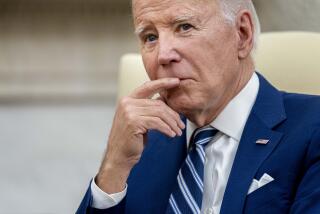Shevardnadze Quits Party, Denounces ‘Stalinist’ Trend : Soviet Union: The ex-foreign minister’s resignation may prompt other liberal Communists to desert.
MOSCOW — Eduard A. Shevardnadze, the former Soviet foreign minister, announced his resignation Thursday from the Communist Party in a break likely to prompt other liberals to quit and further weaken the party’s hold on power.
Shevardnadze, who resigned in December as foreign minister--warning then that the country was slipping into a dictatorship--accused the party of reverting to its old Stalinist ways by launching an “inquisition” into his recent public statements and his role in organizing the new Democratic Reform Movement.
In a stinging attack on the party, Shevardnadze said that its investigation and a summons this week to appear before a disciplinary tribunal had confirmed in his mind the urgency of leaving an organization that he now sees as virtually working to defeat the reforms of perestroika.
“My statements on the need to establish a party that would perform on a par with the Communist Party gave no legal or moral grounds for actions of this kind,” Shevardnadze said, denouncing the party’s Central Control Commission in his resignation statement.
“I also believe the right that each party member has to state and defend his ideas and views in public cannot be subjected to any limitations. This right was returned to us by perestroika , a process known to have been launched by the party.”
Boris N. Yeltsin, Russia’s newly elected president, gave his support to the Democratic Reform Movement on Thursday, and he predicted that many more members would follow Shevardnadze in quitting the Communist Party.
“My closest brothers-in-arms are in the movement--and that means something,” Yeltsin said in a television interview. “We will have to see how the movement develops, and I would like it to develop. . . . But if you want to participate in it, then you must leave the Communist Party.”
Shevardnadze, 63, was one of Soviet President Mikhail S. Gorbachev’s strongest supporters in drafting the political and economic reforms of perestroika ; as foreign minister he put into effect the “new political thinking” that transformed the Soviet Union’s posture in the world and played a key role in ending the Cold War.
Reproaching the party he had joined in 1948 and in whose top councils he had sat for nearly 20 years, Shevardnadze said: “I had every reason to think that comrades in the top party leadership who claimed to have distanced themselves from dissent-suppressing practices . . . would understand the motives by which I was guided.
“Instead, quite in the spirit of the Inquisition, they decided to launch an investigation pursuing questionable goals. Under no circumstances will I agree to be brought as a defendant before this kangaroo court.”
The Communist Party has enforced strict party discipline in gaining and holding power, and through its history has relentlessly purged dissidents. In the era of the dictator Josef Stalin, dissidents were often imprisoned and sometimes executed; in recent years, they have continued to be smeared in press campaigns, investigated on charges of fraud or corruption or denounced as conspiring against perestroika.
Shevardnadze said his decision was “difficult . . . but necessary,” adding that “ . . . I am fully aware of its likely consequences.”
He said he had information that the party is preparing a campaign against him and his supporters “on the basis of the rich experience of the past and with reliance on the long-practiced methods.”
Shevardnadze’s letter, released through the independent Soviet news agency Interfax, was sent Wednesday to the party committee at the Foreign Ministry as well as to party headquarters, according to his press spokesman.
“We have received Eduard Shevardnadze’s application,” Valery Lipnyakov, the party secretary at the Foreign Ministry, said, “and there will be no obstacles for his resignation. We do not want to drag this out.”
Lipnyakov added that party members at the Foreign Ministry had opposed the investigation undertaken by the Central Control Commission, warning that it would be divisive, but that party headquarters had nonetheless pursued it.
In a party whose ranks have dropped from more than 19 million to 16.3 million at the end of last year and are still declining amid the sharp conflicts between its liberal and conservative wings, Shevardnadze’s resignation could lead many others to quit, possibly to join the rival Democratic Reform Movement.
“Any party member will now have to stop and think, ‘If Shevardnadze couldn’t change things at the top, if what he saw persuaded him to leave, why should I stay?’ ” said Fyodor M. Burlatsky, editor of the liberal weekly newspaper Literaturnaya Gazeta. “I’m in that category myself--should I stay, and if so, for what?”
Shevardnadze had remained a member of the party’s policy-making Central Committee after resigning as foreign minister; since founding the Soviet Foreign Policy Assn. in April, he has become increasingly active in domestic politics and traveled widely abroad.
BACKGROUND
Eduard Amvrosiyevich Shevardnadze was born in Mamati, a small town in southern Georgia, on Jan. 25, 1928, and was a Communist Party member at the age of 20. He went on to head Georgia’s Communist Youth League and the republic’s party. Shevardnadze was promoted twice in two days in July, 1985, first to full membership in the Communist Party’s ruling Politburo and then to foreign minister. As Mikhail S. Gorbachev’s foreign minister, he helped shape the reforms of perestroika and form a new international image for the Soviet Union. He resigned last December, warning that the country faced impending dictatorship. He spent the next few months writing and promoting his autobiography, setting up a foreign policy institute in Moscow and touring the West, where he first hinted that he might help form a new political party.
More to Read
Sign up for Essential California
The most important California stories and recommendations in your inbox every morning.
You may occasionally receive promotional content from the Los Angeles Times.










